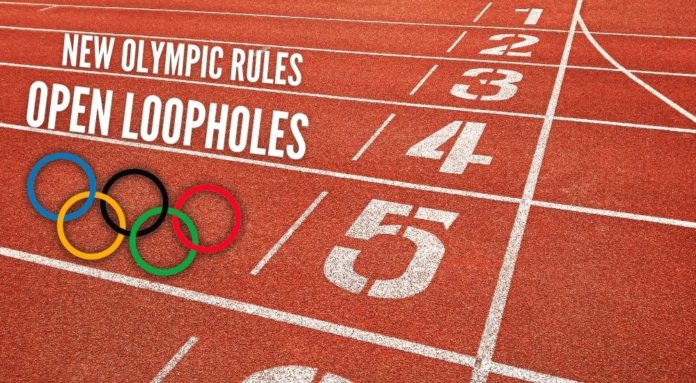International athletic competitions could soon become unrecognizable as a controversial decision from the recent Winter Olympic games threatens to establish a new precedent in terms of who––and what––can compete at sport’s highest level. As the International Olympic Committee proves its willingness to toss aside established rules on even the flimsiest of pretenses, some competing countries are beginning to wonder just how far the envelope can be pushed. Mexico and the United States are expected to be among the first to test the waters, entering some conspicuously overpowered competitors in the qualifying rounds of an upcoming track and field event. Despite competing alongside top-level sprinters from Greece, Senegal, and Germany, the 200-meter race is expected to come down to the 2022 Chevy Silverado 1500 vs 2022 Ford F-150.
Representing the U.S., the 2022 Silverado is an odds-on favorite to win the race with the Mexico-produced Ford a close second. While the race is still years off, the new entrants have already had a marked effect on the competition. The International Association of Athletics Federations has announced a blanket ban on non-human competitors, but they also haven’t gone out of their way to be accommodating. For example, lanes will not be widened to allow for the increased bulk of the petro-Olympians, leading a number of human racers to pull out of the race for fear of being run over.
While the top-heavy race isn’t expected to be much of a competition, it does present a unique opportunity for bettors who at the time of writing could get odds in the neighborhood of 835:1. If the 200-meter race is carried off without incident––or too many cases of vehicular manslaughter––other countries are expected to follow suit in upcoming competitions. Never one to be left behind when it comes to gaining an illicit edge in international sports competitions, Russia is reportedly working to retrofit its T-14 Armata tank for future events.
Producing up to 1,500 horsepower and armed with a 125 mm smoothbore cannon, the Armata is only limited by the fact that it can only complete one race before the track surface needs to be replaced entirely. The trend is seemingly gaining traction with world superpowers––at least those big enough to bully the IOC into ignoring its own rules––with China exploring how to modify a fleet of attack helicopters to participate in the long jump and pole vault competitions.
“We don’t consider it ‘cheating’ so much as ‘innovation,’” says U.S. Track and Field spokesperson Monica Goddard. “You wouldn’t call the first runner to put spikes on their shoes a ‘cheater,’ and this isn’t any different: there’s still an athlete in there behind the whole, it’s just that their ‘shoes’ now have 4-wheel drive and 430 horsepower.”
In defending their decision to bend the already ill-enforced rules, countries cite the recent example of 15-year-old Russian skater Kamila Valieva, who was allowed to compete in the gold medal round of the Beijing Olympics despite a failed drug test that would have seen her suspended from international competition altogether. Valieva, who tested positive for the prescription heart medication Trimetazidine, was briefly suspended from the Olympics following the results of a failed test from late December was reinstated just days later after an appeal from Russia’s Olympic organizers.
The failed test is far from an isolated incident in Russian athletics: the country was banned from officially participating in the games following a scandal during the 2014 Sochi Olympics when a state-sponsored doping program was found to have benefitted over 1,000 athletes over a four year period from 2011 to 2015. The country is still technically barred from the games, though its competitors are still allowed to compete under the banner of the Russian Olympic Committee (ROC), which is somehow different.
While the antianginal heart medication serves a legitimate purpose for those suffering from heart disease, the average user tends to be some 50 years older than Valieva, leading some skeptics to believe that the Gen Z skater––who is the same age as the iPhone––might not have actually had a legitimate reason for testing positive.
Eager to not have competitions seem like a total scam, the IOC announced it will still require the new participants to be tested––though by slightly different standards. All vehicles will be checked to ensure they’re operating on nothing richer than 87 octane gasoline, though exceptions can be made for any countries that can contribute a significant bribe. Organizers had briefly considered creating a new category specifically for the pickups, a 4 x 400 m x 4WD relay, but nixed the plan owing to logistical concerns. “It was a promising idea, but the baton hand-offs were just resulting in too many collisions,” Goddard says.
Traditional runners are understandably irate about the new policy, but it could well be a financial boon for organizers. As these competitions become overrun with automotive athletes and are essentially turned into extended car commercials, sponsorship opportunities abound. “No one was too interested in taking out ads when it was a bunch of people running around an oval, but introduce some noxious fumes, and suddenly we’ve got major corporations beating down our door to turn us into the next NASCAR,” says Goddard.












